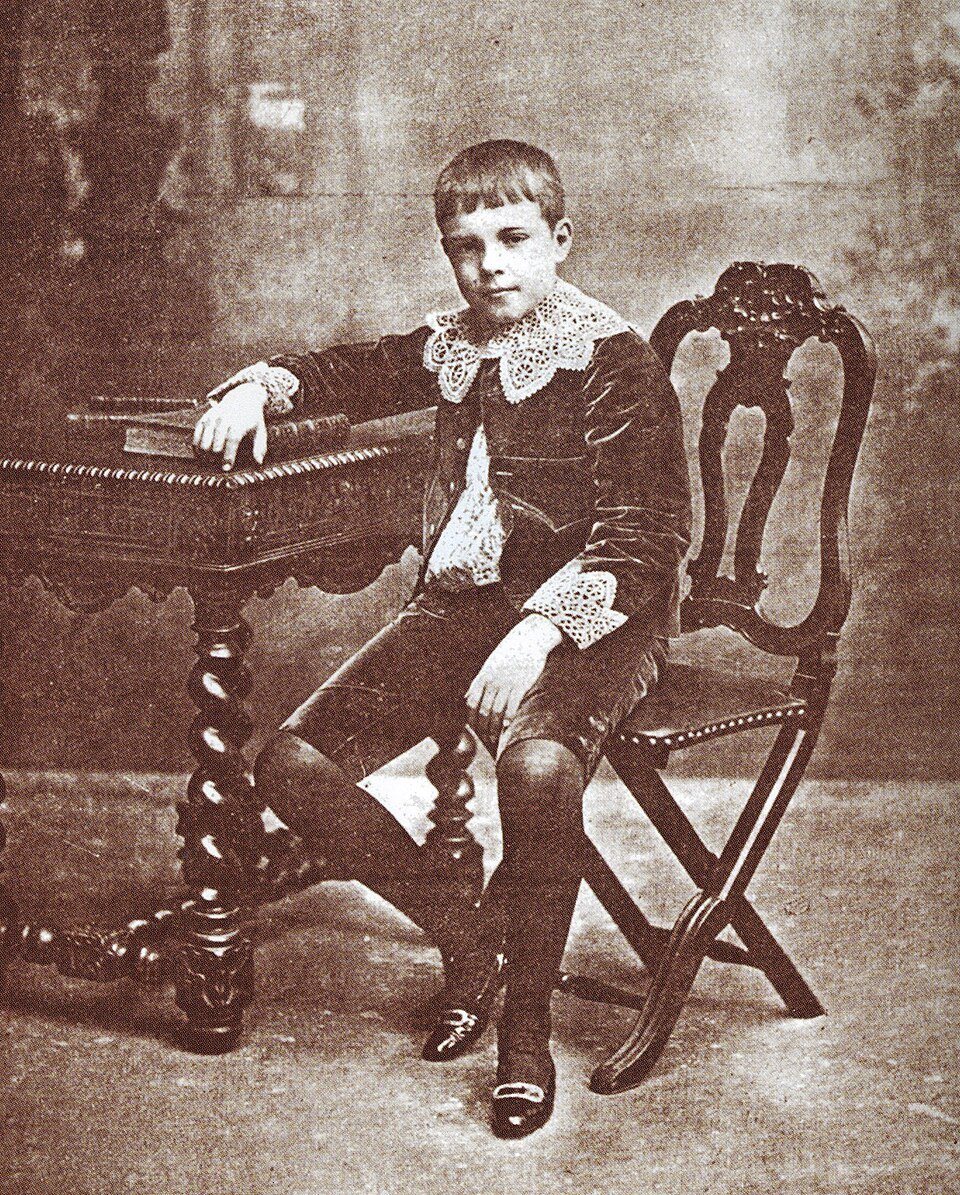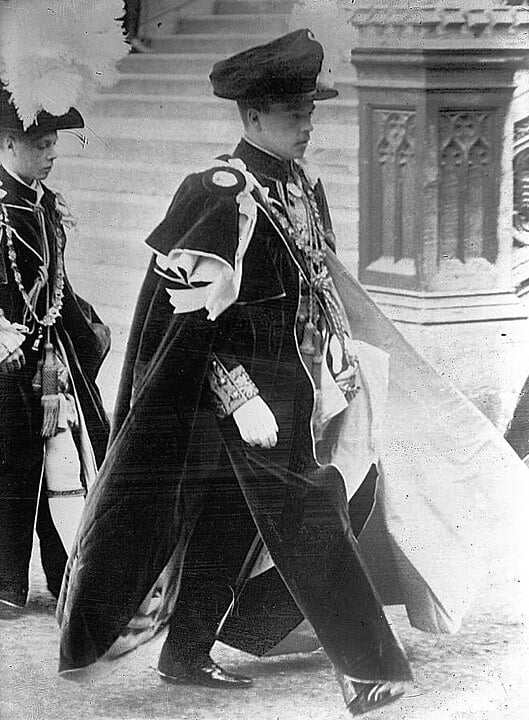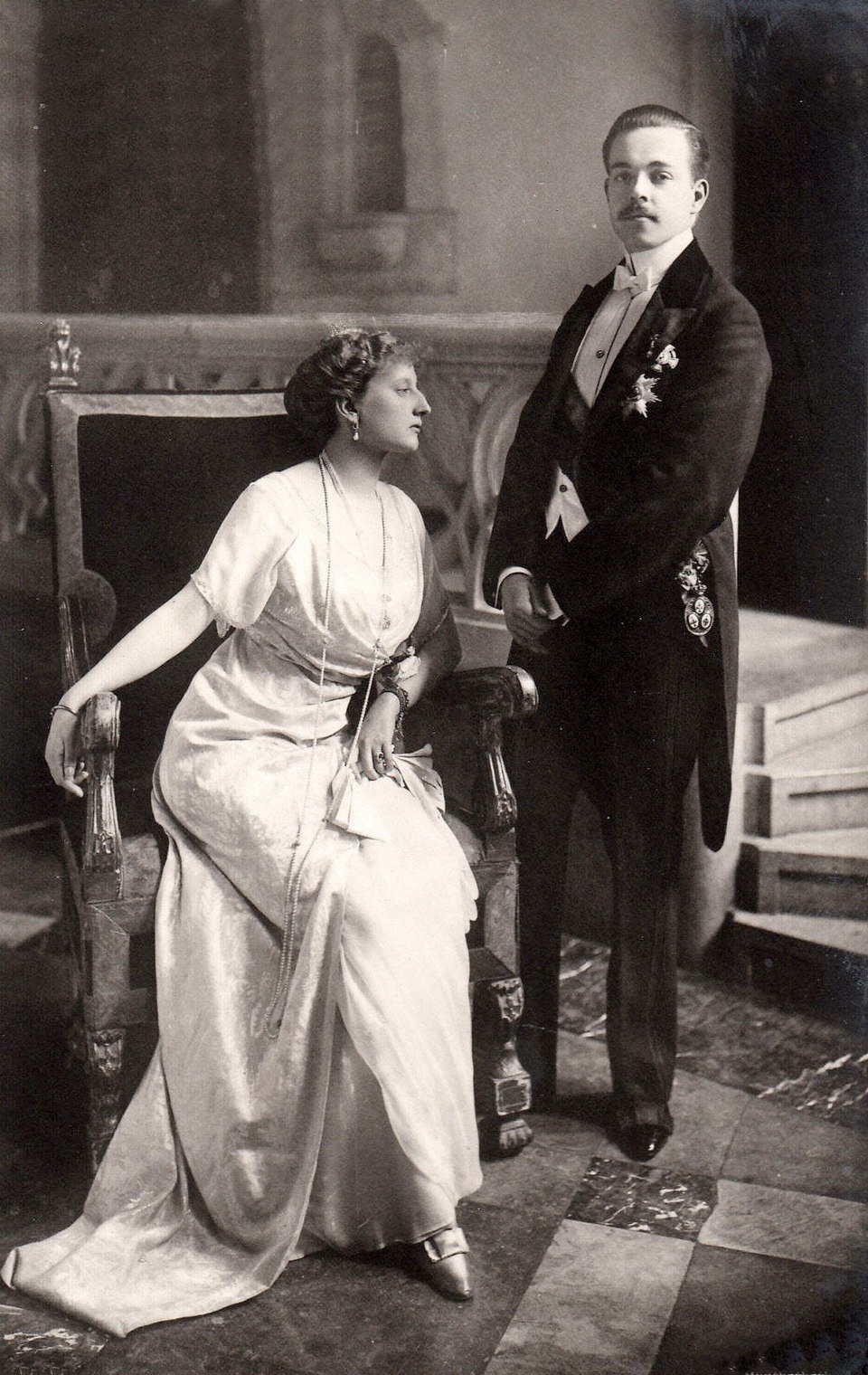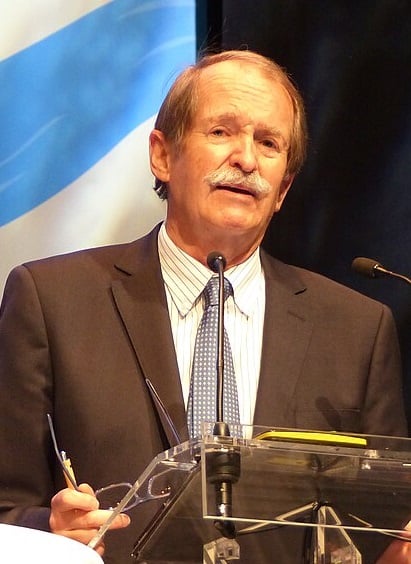Manuel II’s story reads like a tragic novel. He was a young prince thrust into power during one of the most turbulent periods in Portuguese history, only to witness the end of a monarchy that had ruled for centuries. Known as both “The Patriot” and “The Unfortunate,” his brief reign marked the final chapter of royal rule in Portugal.
1. He never expected to be king.
Born on November 15, 1889, in the opulent royal palace of Belém in Lisbon, Manuel Maria Filipe Carlos Amélio Luís Miguel Rafael Gabriel Gonzaga Xavier Francisco de Assis Eugénio de Bragança e Saxe-Coburgo-Gotha (yes, you read that right!) was the second son of King Carlos I, which meant the throne was never supposed to be his. His older brother Prince Luís Filipe was the heir apparent groomed from birth to become the next king.
This birth order actually worked in Manuel’s favor during his formative years. While his brother underwent intensive political training and statecraft education, Manuel was free to pursue a more well-rounded royal education. He excelled in literature, history, and languages and developed the intellectual curiosity that would later serve him well during his years in exile. His education also included physical disciplines like fencing and navigation, skills that reflected the traditional military heritage of Portuguese royalty. The young prince showed a particular aptitude for scholarly pursuits, which would ultimately define his later life when the crown was no longer his burden to bear.

2. His father and brother were killed in a devastating assassination that changed everything.
On February 1, 1908, Manuel’s world shattered in an instant during what became known as the Lisbon Regicide. The royal family was returning from their estate at Vila Viçosa when tragedy struck in broad daylight at the Terreiro do Paço, one of Lisbon’s most prominent public spaces also known as Praça do Comércio. Republican assassins, driven by mounting frustration with the monarchy’s authoritarian policies, opened fire on the open carriage carrying the royal family.
The attack was swift and devastating. King Carlos I was killed instantly, while Crown Prince Luís Filipe, though initially surviving the first shots, died shortly thereafter from his wounds. Manuel, sitting in the same carriage, witnessed the brutal murder of his father and brother while somehow escaping with only minor injuries. The traumatic experience would haunt him for the rest of his life, but in that moment, the 18-year-old prince had no time to grieve. He was suddenly the King of Portugal and inherited both a throne that had become a target and a kingdom teetering on the precipice of revolution.
3. His reign lasted only two years.
Manuel II’s time on the throne was remarkably brief. He only ruled from 1908 to 1910. However, those 26 months were packed with more political drama and upheaval than many monarchs face in decades. Portugal in 1908 was a nation in crisis: the economy was stagnating, political parties were deeply divided, and the republican movement had gained significant momentum among intellectuals, military officers, and the urban working class.
The challenges facing the young king were immense. The monarchy had lost much of its traditional support base, and many Portuguese citizens viewed the royal family as out of touch with the nation’s struggles. Economic hardship was widespread, with Portugal lagging behind other European nations in industrialization and modernization. Social unrest was common, and the republican movement offered an appealing alternative to many who had lost faith in monarchical rule. Despite these overwhelming obstacles, Manuel attempted to navigate the political minefield with a maturity that belied his young age, though ultimately the forces arrayed against the monarchy proved too powerful to overcome.
4. He fired the controversial Prime Minister as one of his first acts as king.
One of Manuel’s first and most significant acts as king was dismissing João Franco, the authoritarian prime minister whose harsh policies and dictatorial methods had intensified public anger against the monarchy. Franco had ruled with an iron fist, both suspending constitutional guarantees and governing by decree. This had alienated broad segments of Portuguese society and strengthened the republican cause.
The decision to remove Franco was both politically astute and personally brave for the young monarch. Franco had been his father’s chosen minister, and dismissing him was essentially a repudiation of his father’s political legacy. In Franco’s place, Manuel appointed Admiral Francisco Joaquim Ferreira do Amaral to lead a coalition government that included members from both major parties known as the Regenerators and the Progressists. This move represented Manuel’s attempt to return to constitutional governance and heal the deep political wounds that had been festering under Franco’s authoritarian rule. However, the damage to the monarchy’s reputation had already been done.
5. He tried to make peace with republicans.
Unlike many monarchs faced with opposition, Manuel II actively sought dialogue with republican leaders. He demonstrated a political sophistication that was remarkable for someone so young and inexperienced. He recognized that the old ways of ruling were no longer sustainable in a rapidly changing world where democratic ideals were gaining ground across Europe.
The young king made efforts included attempts to expand political participation, reduce royal prerogatives, and create a more inclusive system of governance. Manuel understood that Portugal needed to evolve with the times or risk being swept away by the tide of republican sentiment. He even considered the possibility of transforming Portugal into a constitutional monarchy similar to those in Britain or other European nations. Unfortunately, the republican movement had already gained too much momentum, and many of its leaders wanted complete political transformation and the end of monarchical rule altogether.
6. The October 1910 Revolution ended Manuel II’s reign.
The final blow came on October 5, 1910 when a carefully orchestrated military uprising supported by civilian republicans erupted in Lisbon. The revolution began in the early hours of the morning when republican forces seized key points throughout the capital city. The warship Adamastor, which was positioned in the Tagus River, turned its guns on the Necessidades Palace where Manuel was residing. This sent a clear and unmistakable message that the monarchy’s time had come to an end.
As cannon fire echoed through the streets and revolutionary forces took control of government buildings, it became clear that Manuel’s position had become completely untenable. Rather than risk a civil war that would bring tremendous suffering to the Portuguese people, the young king made the difficult but honorable decision to abdicate his throne and leave the country. His departure marked both the end of his personal reign and the conclusion of nearly eight centuries of monarchical rule in Portugal.
7. He escaped Portugal on a British naval vessel.
Manuel’s departure from Portugal was as dramatic as his brief reign. On the morning of October 5, 1910, as revolutionary forces tightened their grip on Lisbon, Manuel and his mother, Queen Amélie, made a desperate flight from the capital. First, they sought refuge at the National Palace in Mafra, but even this historic royal residence proved unsafe as republican forces advanced.
The royal family ultimately made their way to the small fishing town of Ericeira, northwest of Lisbon, where they boarded the royal yacht Amélia. From there, they sailed to safety aboard a British warship anchored in the Tagus River, which was an ironic end given Portugal’s historic alliance with Britain. The young king took one last look at the Portuguese coastline as the ship carried him away from the only home he had ever known. He was just 20 years old, and he would never again set foot on Portuguese soil. The sight of the last King of Portugal sailing into exile marked the end of an era that had begun with the founding of the Portuguese kingdom in the 12th century.
8. He became a distinguished scholar in exile.
Rather than wallowing in bitterness or plotting a return to power like many deposed monarchs, Manuel II channeled his considerable intellect and energy into scholarly pursuits that would benefit Portuguese culture for generations to come. He settled in Twickenham, near London, in a modest but comfortable home that he transformed into a center of Portuguese learning and culture. The house became known for its remarkable library, which Manuel painstakingly assembled over the years, collecting rare Portuguese books, manuscripts, and historical documents.
During his exile, he wrote “Early Portuguese Books, 1489–1600,” a three-volume monument to Portuguese literary and cultural heritage. This comprehensive bibliography took years of meticulous research and scholarship and remains an invaluable resource for historians, bibliographers, and anyone interested in Portuguese culture and literature.

9. He married into German nobility.
In 1913, three years after his exile began, Manuel married Princess Augusta Victoria of Hohenzollern-Sigmaringen. The wedding was a significant social event among European nobility and was attended by representatives from royal houses across the continent who still recognized Manuel’s legitimate claim to the Portuguese throne.
Augusta Victoria was a woman of considerable intelligence and character, and she proved to be a devoted companion to Manuel throughout their years together. The couple shared interests in literature, history, and culture, and Augusta Victoria supported Manuel’s scholarly endeavors while also engaging in charitable work within the Portuguese exile community in London. Their marriage, though it took place far from the Portuguese soil that Manuel could never again call home, provided him with stability and companionship during what could have been very lonely years in exile.

10. He had no children.
One of the most poignant and historically significant aspects of Manuel’s story is that he and Princess Augusta Victoria never had children, despite nearly two decades of marriage. This childlessness carried profound implications that extended far beyond personal disappointment. It meant that, when Manuel died, the direct royal line that had ruled Portugal for centuries would come to an end and symbolically closed the book on the Portuguese monarchy forever.
The absence of an heir also meant that Manuel could never harbor realistic hopes of a restoration, as there would be no son to carry on his claim or to potentially benefit from any future political changes in Portugal. This reality may have contributed to Manuel’s peaceful acceptance of his fate and his decision to dedicate himself to scholarly rather than political pursuits. In a very real sense, Manuel was not just the last King of Portugal to rule, but the last King of Portugal, period.
11. He died young and far from home.
Manuel II’s life was cut tragically short when he died on July 2, 1932, at just 42 years old, after succumbing to complications from a throat infection that developed into a more serious condition. His death occurred at his home in Twickenham, surrounded by his beloved books and manuscripts but far from the Portuguese landscapes of his youth. The irony was not lost on observers that a man who had spent his exile years preserving Portuguese culture and literature would die without ever again seeing the country that had shaped his identity.
His funeral in England was a dignified affair that reflected both his royal status and his scholarly achievements. The ceremony was attended by members of European royalty, exiled Portuguese nobles, and British scholars who had come to respect his intellectual contributions. Representatives from Portuguese communities throughout Europe came to pay their respects to the man who, despite losing his throne, had never stopped serving as an ambassador for Portuguese culture.
12. Portugal was one of the first monarchies to fall.
When Manuel fled in 1910, Europe still had a lot of monarchies. At the time of Manuel’s birth in 1889, only Switzerland and France were republics on the continent. Portugal’s republican revolution thus represented an early wave in what would become a much larger transformation of European political systems.
The Portuguese Republic established in 1910 would serve as a model and inspiration for other republican movements across Europe, especially in the aftermath of World War I when several major monarchies would collapse. Manuel’s overthrow was part of a broader wave of democratic movements that would reshape the entire continent.
What Happened to the Portuguese Royal Family?
Following Manuel II’s death without heirs in 1932, the question of royal succession fell to the constitutional rules governing the Portuguese crown. According to these laws, the throne would pass to the nearest legitimate male relative with Portuguese nationality from a collateral line of the royal family.
This succession passed to the descendants of Dom Miguel I, who had been Manuel’s great-great-uncle and had a claim to the throne during the 19th-century civil wars. Dom Miguel’s line had been in exile since the 1830s, but they maintained their claim to royal status.
Dom Duarte Nuno, a descendant of Dom Miguel I, became the head of the Portuguese Royal House after Manuel II’s death. When Dom Duarte Nuno died in 1976, leadership passed to his eldest son, Dom Duarte Pio, who was born in Switzerland in 1945.
Today’s Portuguese Royal Family
Dom Duarte Pio currently serves as the Duke of Braganza and head of the Portuguese Royal House. In 1995, he married Isabel Inês de Castro Curvello de Herédia in what was the first royal wedding to take place on Portuguese soil since 1886. The couple has three children: Prince Afonso (born 1996), who holds the title Prince of Beira and works in asset management in Geneva, Infanta Maria Francisca (born 1997), who married in 2023 and previously worked in communications, and Infante Dinis (born 1999), who studies International Relations and is developing a consulting business.

The family was allowed to return to Portugal in the 1950s when the laws of exile were finally repealed. Dom Duarte Pio has dedicated himself to cultural and charitable work. He played a notable role in advocating for East Timor’s independence and was even granted Timorese citizenship in recognition of his efforts.
While Portugal remains a republic with no plans to restore the monarchy, the Braganza family continues to serve as cultural ambassadors for Portuguese heritage and maintains connections with royal houses across Europe. They represent a living link to Portugal’s monarchical past while adapting to their role in the modern democratic nation that emerged from the revolution that ended Manuel II’s brief and tragic reign over a century ago.



What actually emerged from the 1910 revolution was nearly two decades of serious political and social instability, followed by nearly half a century of dictatorship. Democracy was only restored to Portugal in 1974.